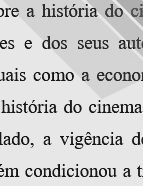

................................
Viewed from a highly political standpoint, a common factor among these publications, these works illustrated the type of editorial effervescence that marked the "ongoing revolutionary process". The new political and aesthetic orientations resulting from the revolution fostered a redefinition of the official vision of the history of Portuguese cinema, focusing above all on themes of a social and political nature which, during the former regime, would have encountered serious difficulties in terms of their publication.
In the meantime, Henrique Alves Costa, a film club member, resumed the publication of works written as revisitations of the past, with little methodological attention, and which relied heavily on the author's memories. In a coherent fashion, his Breve História do Cinema Português 1896-1962 [Concise History of Portuguese Cinema 1896-1962] - part of a collection of cultural syntheses edited by the Instituto de Cultura Portuguesa [Institute of Portuguese Culture] – advances a very personal view of the national cinematographic trajectory, where his preferences and aesthetic objections are evident.
Considering the publication of a follow-up to this concise history, the Instituto de Cultura Portuguesa delegated its update to another non-historian: Eduardo Prado Coelho, a renowned film critic with even fewer methodological concerns than the author from Porto, was the author of Vinte Anos de Cinema Português 1962-1982 [Twenty years of Portuguese Cinema] (1983), a kind of catalogue of the most significant films of that period. Using a strictly internal analysis of the cinematographic works, Prado Coelho rejects factors of a contextual nature alien to the narrative construction, valuing the work as a purely aesthetic product. Using a similar approach, Salvato Teles de Menezes reviewed the Portuguese film production of the decade following the 1974 revolution. After a brief general introduction to the period under study (1974-84), he focuses on film production and analyses those he deems most important and representative of Portuguese cinema of the post-April 25 period.
From a historiographical point of view, António Videira Santos who was committed to the "primitive" history of Portuguese cinema, was a highly relevant figure during this period.
